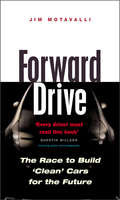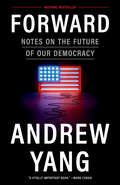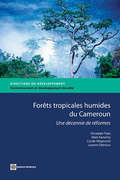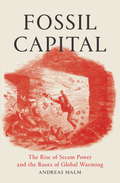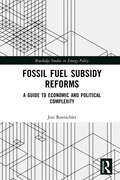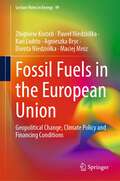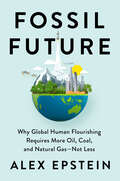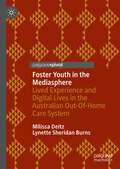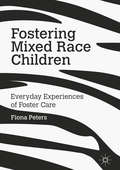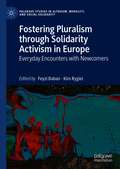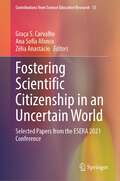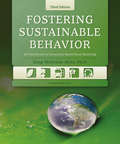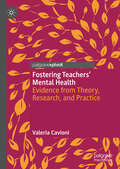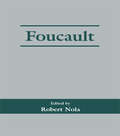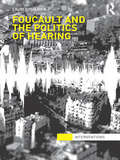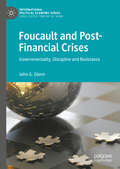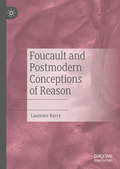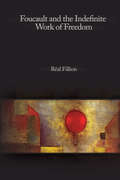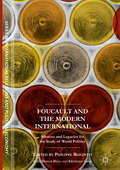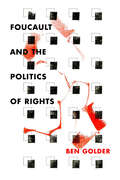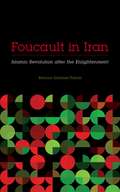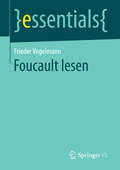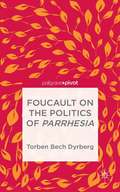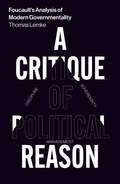- Table View
- List View
Forward Drive: The Race to Build the Clean Car of the Future
by Jim MotavalliThis comprehensive account of the past, present and future of the automobile examines the key trends, key technologies and key players involved in the race to develop clean, environmentally friendly vehicles that are affordable and that do not compromise on safety or design. Undertaking a rigorous interrogation of our global dependency on oil, the author demonstrates just how unwise and unnecessary this is in light of current developments such as the fuel cell revolution and the increasing viability of hybrid cars, which use both petrol and electricity - innovations that could signal a new era of clean, sustainable energy. The arguments put forward draw on support from an eclectic range of sources - including industry insiders, scientists, economists and environmentalists - to make for an enlightening read.
Forward: Notes on the Future of Our Democracy
by Andrew YangA lively and bold blueprint for moving beyond the &“era of institutional failure&” by transforming our outmoded political and economic systems to be resilient to twenty-first-century problems, from the popular entrepreneur, bestselling author, and political truth-teller &“A vitally important book.&”—Mark Cuban Despite being written off by the media, Andrew Yang&’s shoestring 2020 presidential campaign—powered by his proposal for a universal basic income of $1,000 a month for all Americans—jolted the political establishment, growing into a massive, diverse movement. Now, in Forward, Yang reveals that UBI and the threat of job automation are only the beginning, diagnosing how a series of cascading problems within our antiquated systems keeps us stuck in the past—imperiling our democracy at every level. With America&’s stagnant institutions failing to keep pace with technological change, we grow more polarized as tech platforms supplant our will while feasting on our data. Yang introduces us to the various &“priests of the decline&” of America, including politicians whose incentives have become divorced from the people they supposedly serve. The machinery of American democracy is failing, Yang argues, and we need bold new ideas to rewire it for twenty-first-century problems. Inspired by his experience running for office and as an entrepreneur, and by ideas drawn from leading thinkers, Yang offers a series of solutions, including data rights, ranked-choice voting, and fact-based governance empowered by modern technology, writing that &“there is no cavalry&”—it&’s up to us. This is a powerful and urgent warning that we must step back from the brink and plot a new way forward for our democracy.
Forêts Tropicales Humides du Cameroun
by Carole Megevand Giuseppe Topa Laurent Debroux Alain KarsentyEn 1994, le gouvernement camerounais a initié des réformes légales et commerciales visant à réguler les droits d'accès et d'usage des forêts tropicales, qui constituent une richesse incontestable pour le pays. Ces réformes cherchaient à équilibrer les intérêts publics et privés et à plus largement intégrer les perspectives économiques, culturelles et environnementales. Aujourd'hui, plus de 60 pourcent des forêts tropicales du Cameroun sont exploitées selon un plan d'aménagement agréé. L'exploitation illégale dans les forêts aménagées a significativement diminué, la biodiversité est protégée plus efficacement et l'industrie forestière, restructurée, adhère largement aux pratiques de gestion durable reconnues internationalement. Basé sur des données historiques, des recherches spécifiques et des travaux analytiques, 'Forêts tropicale humides du Cameroun : Une décennie de réformes' présente la genèse et le déploiement de ces réformes. Ce livre identifie les politiques qui ont porté leur fruit, celles qui n'ont pas fonctionné et propose des améliorations. Bien que ces réformes aient été élaborées et mises en oeuvre dans un contexte spécifique, les enseignements tirés de cette expérience pourront servir à d'autres pays, connaissant des réalités similaires. Ce livre devrait être notamment utiles aux analystes politiques et experts du développement, ainsi qu'aux gouvernements, aux populations et aux agences de développement des pays riches en forêts tropicales, en Afrique et ailleurs.
Fossil Capital: The Rise of Steam Power and the Roots of Global Warming
by Andreas MalmHow capitalism first promoted fossil fuels with the rise of steam powerThe more we know about the catastrophic implications of climate change, the more fossil fuels we burn. How did we end up in this mess? In this masterful new history, Andreas Malm claims it all began in Britain with the rise of steam power. But why did manufacturers turn from traditional sources of power, notably water mills, to an engine fired by coal? Contrary to established views, steam offered neither cheaper nor more abundant energy--but rather superior control of subordinate labour. Animated by fossil fuels, capital could concentrate production at the most profitable sites and during the most convenient hours, as it continues to do today. Sweeping from nineteenth-century Manchester to the emissions explosion in China, from the original triumph of coal to the stalled shift to renewables, this study hones in on the burning heart of capital and demonstrates, in unprecedented depth, that turning down the heat will mean a radical overthrow of the current economic order.From the Trade Paperback edition.
Fossil Fuel Subsidy Reforms: A Guide to Economic and Political Complexity (Routledge Studies in Energy Policy)
by Jun RentschlerCountries around the world are spending up to $500 billion per year on subsidising fossil fuel consumption. By some estimates, the G20 countries alone are spending around another $450 billion on subsidising fossil fuel production. In addition, the indirect social welfare costs of these subsidies have been shown to be substantial – for instance due to air pollution, road congestion, climate change, and economic inefficiency, to name a few. Considering these numbers, there is no doubt that fossil fuel subsidies cause severe economic distortions that compromise countries’ prospects of achieving equitable and sustainable development. This book provides a guide to the complex challenge of designing, assessing, and implementing effective fossil fuel subsidy reforms. It shows that subsidy reform requires a careful balancing of complex economic and political trade-offs, as well as measures to mitigate adverse effects on vulnerable households and to assist firms with implementing efficiency enhancing measures. Going beyond the purely fiscal perspective, this book emphasises that smart subsidy reforms can contribute to all three dimensions of sustainable development – environment, society, and economy. Over the course of eight chapters, this book considers a wide range of agents and stakeholders, markets, and policy measures in order to distil the key principles of designing effective fossil fuel subsidy reforms. This book will be of great relevance to scholars and policy makers with an interest in energy economics and policy, climate change policy, and sustainable development more broadly.
Fossil Fuels in the European Union: Geopolitical Change, Climate Policy and Financing Conditions (Lecture Notes in Energy #99)
by Kari Liuhto Zbigniew Korzeb Paweł Niedziółka Agnieszka Bryc Dorota Niedziółka Maciej MrózThis book identifies scenarios for changes in transmission infrastructure, contracting, consumption patterns and fossil fuel financing policies, considering climate goals and the consequences of the conflict in Ukraine. The invasion of Ukraine by the Russian Federation has fundamentally changed the geopolitical situation, approaches to energy security issues, the EU’s energy (in)dependence and the implementation of previously outlined climate policies, including the planned gradual withdrawal from fossil fuels.This book presents the geopolitical architecture, energy mix, energy fuel supply structure, long-term energy policy and financing conditions of the oil and gas and sectors in the EU in the period preceding and following the Russian invasion of Ukraine. The authors consider the date of Russia’s attack on Ukraine as a symbolic caesura marking the beginning of the process of creating a new energy order in the EU. A novel part of the book is the attention it pays to the role of the credit and investment policy of the EU banking sector in relation to carbon-intensive sectors and to the significance of the financial system from the point of view of the effectiveness of international sanctions imposed on the Russian Federation, including, above all, sanctions related to the fossil fuel sector. The book is of interest to researchers and all those interested in learning about these subjects.
Fossil Future: Why Global Human Flourishing Requires More Oil, Coal, and Natural Gas--Not Less
by Alex EpsteinThe New York Times bestselling author of The Moral Case for Fossil Fuels draws on the latest data and new insights to challenge everything you thought you knew about the future of energyFor over a decade, philosopher and energy expert Alex Epstein has predicted that any negative impacts of fossil fuel use on our climate will be outweighed by the unique benefits of fossil fuels to human flourishing--including their unrivaled ability to provide low-cost, reliable energy to billions of people around the world, especially the world&’s poorest people. And contrary to what we hear from media &“experts&” about today&’s &“renewable revolution&” and &“climate emergency,&” reality has proven Epstein right: • Fact: Fossil fuels are still the dominant source of energy around the world, and growing fast—while much-hyped renewables are causing skyrocketing electricity prices and increased blackouts. • Fact: Fossil-fueled development has brought global poverty to an all-time low. • Fact: While fossil fuels have contributed to the 1 degree of warming in the last 170 years, climate-related deaths are at all-time lows thanks to fossil-fueled development. What does the future hold? In Fossil Future, Epstein, applying his distinctive &“human flourishing framework&” to the latest evidence, comes to the shocking conclusion that the benefits of fossil fuels will continue to far outweigh their side effects—including climate impacts—for generations to come. The path to global human flourishing, Epstein argues, is a combination of using more fossil fuels, getting better at &“climate mastery,&” and establishing &“energy freedom&” policies that allow nuclear and other truly promising alternatives to reach their full long-term potential. Today&’s pervasive claims of imminent climate catastrophe and imminent renewable energy dominance, Epstein shows, are based on what he calls the &“anti-impact framework&”—a set of faulty methods, false assumptions, and anti-human values that have caused the media&’s designated experts to make wildly wrong predictions about fossil fuels, climate, and renewables for the last fifty years. Deeply researched and wide-ranging, this book will cause you to rethink everything you thought you knew about the future of our energy use, our environment, and our climate.
Foster Youth in the Mediasphere: Lived Experience and Digital Lives in the Australian Out-Of-Home Care System
by Lynette Sheridan Burns Milissa DeitzThis book considers the impact of digital media and technology on lived experience for young people in foster care. While the extent and intricacies of foster care—known as out-of-home care (OOHC) in Australia, where this study takes place—are not widely understood by the general public, youth in care might struggle to construct a personal identity that goes beyond reflecting the stereotypes and stigma by which they are often recognised. In today’s digital environment, media can play a significant role in any individual’s developing sense of self, identity, and belonging. Deitz and Sheridan Burns examine OOHC through the lens of networked media environments and investigate the conditions that encourage belonging and resilience in order to establish the role that digital technology can play in supporting those conditions for individuals, family networks, and the care sector.
Fostering Friendship: Pair Therapy for Treatment and Prevention (Modern Applications Of Social Work Ser.)
by Robert SelmanA great number of children and adolescents face a world of violence and isolation. In this book, the members of the Group for the Study of Interpersonal Development at the Harvard Graduate School of Education and the Judge Baker Children's Center in Boston describe in detail an innovative intervention and prevention method, pair therapy, that is designed to address these issues by helping children develop healthy interpersonal relationships. Pair therapy is a relationship-oriented treatment modality that addresses the social context of the difficulties encountered in growing up in today's world. This approach has been developed not only as a therapeutic intervention in day and residential treatment centers but also as a prevention method that can be used in public schools, day care centers, and other contexts. This practical volume meets the demand for an accessible, hands-on guide to the pair method. The theoretical foundations of the approach are also presented in an accessible fashion here. The techniques described in this book model a relationship-building process between an adult professional and two children. This process replicates the social relations that happen naturally in healthy and happy interactions and long-term relationships among well-cared-for children in safe and secure communities. This book will be useful for a number of disciplines that deal with younger children and adolescents: social work, education, school and group therapy, and human development. It offers educators, therapists, and other practitioners in a wide variety of settings the opportunity to learn how to develop a pair therapy program. It will also be an indispensable tool in the libraries of mental health practitioners who counsel youth beyond ordinary clinical treatment.
Fostering Mixed Race Children
by Fiona PetersThe 'mixed race' classification is known to be a factor of disadvantage in children's social care and this fastest growing population is more likely than any other ethnic group to experience care admission. How does knowledge of 'mixedness' underpin policy and practice? How, when and why is the classification 'mixed' a disadvantage? Through narrative interviews with children currently in foster care, Fostering Mixed Race Children examines the impact of care processes on children's everyday experiences. Peters shows how the 'mixed race' classification affects care admission, including both short and long term fostering and care leaving, and shapes the experiences of children in often adverse ways. The book moves away from the psychologising of 'mixedness' towards a much-needed sociological analysis of 'mixedness' and 'mixing' at the intersection of foster care processes. This book will be of interest to academics and practitioners working with families and children. Peters presents a child-centred narrative focus and offers unique insights into a complex area.
Fostering Pluralism through Solidarity Activism in Europe: Everyday Encounters with Newcomers (Palgrave Studies in Altruism, Morality, and Social Solidarity)
by Feyzi Baban Kim RygielThis edited collection brings together academics, artists and members of civil society organizations to engage in a discussion about the ideas of living with others, through concepts such as cosmopolitanism, solidarity, and conviviality, and the practices of doing so. In recent years, right wing and populist movements have emerged and strengthened across Europe and North America, rejecting the value of cultural, ethnic and religious plurality. Governments in Europe and North America are weakening their commitment to the international refugee regime, erecting new barriers to entry. Even as governments fail to accommodate growing pluralism, however, civil society initiatives have emerged with the aim of welcoming newcomers, such as migrants and refugees, and finding alternative ways of living together in diverse societies. Motivated by a desire to show solidarity, these initiatives demonstrate enormous creativity in fostering pluralism in an environment that has largely become hostile to the arrival of newcomers. The contributions gathered here seek to explore such initiatives and the important work that they do in fostering ways of living together with others from diverse cultural and religious backgrounds. In focusing conceptually and empirically on discussions and examples of civil society initiatives, this book interrogates why, how and under what circumstances are some communities more welcoming than others.
Fostering Scientific Citizenship in an Uncertain World: Selected Papers from the ESERA 2021 Conference (Contributions from Science Education Research #13)
by Graça S. Carvalho Ana Sofia Afonso Zélia AnastácioThis edited volume brings together innovative research in the field of Science Education, fostering scientific citizenship in an uncertain world. The nineteen chapters presented in this book address diverse topics, and research approaches carried out in various contexts and settings worldwide, contributing to improving and updating knowledge on science education. The book consists of selected high-quality studies presented at the 14th European Science Education Research Association (ESERA) Conference, held online (due to the Covid-19 pandemic) by the University of Minho, Portugal, between August 30th and September 3rd, 2021. Being of great relevance in contemporary science education, this book stimulates reflection on different approaches to enhance a deeper understanding of how better prepare the coming generations, which is of great interest to science education researchers and science teachers.
Fostering Sustainable Behavior
by Doug Mckenzie-MohrTo attain a sustainable future, we must change many of our everyday actions. This completely revised and updated edition of Fostering Sustainable Behavior shows how community-based social marketing is key to overcoming barriers and resistance, and creating new social norms.
Fostering Teachers' Mental Health: Evidence from Theory, Research, and Practice
by Valeria CavioniThis book discusses teachers&’ mental health applying a whole-school approach. Addressing the current teacher recruitment and retention crisis that many countries in Europe are facing, the author discusses the stressors and challenges teachers experience regarding workload, behavioural management and engagement concerns, managing parental expectations, governance issues from governmental agencies, and access to appropriate mental health resources to mitigate some of these. A timely resource, this book explores protective factors for educators' psychological well-being, such as teachers' social and emotional competencies, as well as contextual determinants like the quality of staff relationships, teacher-student relationship, school climate, and school belonging. Its scope extends to practical applications of large-scale European school-based projects in this area, providing readers with evidence-based examples of successful mental health initiatives. Bridging the gap between theory and practice, the book equips educators, researchers, and policymakers with the knowledge and tools to effectively address and enhance teachers&’ mental health and well-being.
Foucault
by Robert NolaFive eminent critics explore the validity of Foucault's ideas on such questions as the fit between power and knowledge and the tension between historicist and universalist claims.The very possibility of a critical stance is a recurring theme in all of Foucault's works, and the contributors vary in the ways that they relate to his key views on truth and reason in relation to power and government.
Foucault & the Politics of Hearing (Interventions)
by Lauri SiisiäinenThe issue of the senses and sensual perception in Michel Foucault’s thought has been a source of prolific discussion already for quite some time. Often, Foucault has been accused of overemphasizing the centrality of sight, and has been portrayed as yet another thinker representative of Western ocularcentricism. This innovative new work seeks to challenge this portrait by presenting an alternative view of Foucault as a thinker for whom the sound, voice, hearing, and listening, the auditory-sonorous, actually did matter. Illustrating how the auditory-sonorous relates most integrally to the most pertinent issues of Foucault - the intertwinement and confrontations of power, knowledge, and resistance - the book both presents novel readings of some of Foucault’s most widely read and commented-on works (such as Discipline and Punish, the first volume of History of Sexuality), and discusses the variety of his lectures, essays, and interviews, some of which have not been noted before. Moving beyond a commentary on Foucault, Siisiainen goes on to examine other philosophers and political thinkers (including Roland Barthes, Jean-Luc Nancy and Jacques Rancière) in this context in order to bring to the fore the potentials in Foucault’s work for the generation of a new perspective for the political genealogy of the sound, hearing, and listening, approaching the former as a key locus of contemporary political struggles. This work will be of great interest to students and scholars in a range of areas including political theory, philosophy, and cultural studies.
Foucault and Post-Financial Crises: Governmentality, Discipline and Resistance (International Political Economy Series)
by John G. GlennThis title explains the causes of the financial crisis and the economic reforms that were created subsequently through a Foucauldian philosophical lens. The author sets out the approaches established by Foucault – namely governmentality, biopolitics and disciplinary mechanisms – explaining how these influenced the shift of production from a local to a global level, alongside a shift towards financialisation. Glenn applies Foucauldian principles to aid understanding of the self-corrective mechanisms applied to the financial system, and the interpellative processes that led to the emergence of a new mode of subjectification. Concurrently, this title examines the retreat of the state from the financial sphere. This shift, the author posits, did not mean the complete absence of governance; rather governance became more concerned with ensuring that financial behaviour was contained within certain limits.
Foucault and Postmodern Conceptions of Reason
by Laurence BarryFor decades Foucault was mostly known for his diagnosis of modernity as a form of entrapment, both in our modes of thought and our behaviors. This book argues that Foucault's reappraisal of modernity occurs with the 1978 and 1979 lectures, in which he sketches modern power as governmentality and neoliberalism. From this perspective, Foucault’s once surprising studies on the Greeks' constitution of the ‘self’ can be seen as a continuation of his diagnosis of late modernity, and as an attempt to retrieve a form of autonomy for our modern selves. One finds in the late Foucault a postmodern conception of reason and not a destruction of reason; but this is possible only if postmodernity is seen as a critical exercise of reason in the analysis of norms.
Foucault and the Indefinite Work of Freedom (Philosophica)
by Réal FillionThis work underscores the need to examine history philosophically, not only to better appreciate how it unfolds and relates to our own unfolding lives, but to better appreciate our free engagement in this changing world. Linking a conception of ourselves as free beings to the historical process was of central importance to the classical speculative philosophies of history of the nineteenth century, most notably Hegel’s. Michel Foucault’s work is often taken to be the antithesis of this kind of speculative approach. This book argues that Foucault, on the contrary, like Hegel, sees freedom as tied to the self-movement of thought as it realizes and shapes the world. Unlike Hegel, however, he does not see in that self-movement the process of Spirit reconciling itself with the world and thereby realizing itself as freedom. Rather, he sees in the freedom at the core of the self-movement of thought a possible threat around which that movement consolidates itself and gives shape to the world. Foucault’s work is therefore not a simple rejection of Hegel’s speculative philosophy of history, but rather an inversion of the manner in which history and freedom are related: for Hegel history realizes or actualizes the “idea” of freedom, whereas for Foucault freedom realizes or actualizes the “materiality” of history.
Foucault and the Modern International: Silences and Legacies for the Study of World Politics (The Sciences Po Series in International Relations and Political Economy)
by Philippe Bonditti, Didier Bigo and Frédéric GrosThis book addresses the possibilities of analyzing the modern international through the thought of Michel Foucault. The broad range of authors brought together in this volume question four of the most self-evident characteristics of our contemporary world-'international', 'neoliberal', 'biopolitical' and 'global'- and thus fill significant gaps in both international and Foucault studies. The chapters discuss what a Foucauldian perspective does or does not offer for understanding international phenomena while also questioning many appropriations of Foucault's work. This transdisciplinary volume will serve as a reference for both scholars and students of international relations, international political sociology, international political economy, political theory/philosophy and critical theory more generally.
Foucault and the Politics of Rights
by Ben GolderThis book focuses on Michel Foucault's late work on rights in order to address broader questions about the politics of rights in the contemporary era. As several commentators have observed, something quite remarkable happens in this late work. In his early career, Foucault had been a great critic of the liberal discourse of rights. Suddenly, from about 1976 onward, he makes increasing appeals to rights in his philosophical writings, political statements, interviews, and journalism. He not only defends their importance; he argues for rights new and as-yet-unrecognized. Does Foucault simply revise his former positions and endorse a liberal politics of rights? Ben Golder proposes an answer to this puzzle, which is that Foucault approaches rights in a spirit of creative and critical appropriation. He uses rights strategically for a range of political purposes that cannot be reduced to a simple endorsement of political liberalism. Golder develops this interpretation of Foucault's work while analyzing its shortcomings and relating it to the approaches taken by a series of current thinkers also engaged in considering the place of rights in contemporary politics, including Wendy Brown, Judith Butler, and Jacques Rancière.
Foucault in Iran: Islamic Revolution after the Enlightenment (Muslim International)
by Behrooz Ghamari-TabriziWere the thirteen essays Michel Foucault wrote in 1978–1979 endorsing the Iranian Revolution an aberration of his earlier work or an inevitable pitfall of his stance on Enlightenment rationality, as critics have long alleged? Behrooz Ghamari-Tabrizi argues that the critics are wrong. He declares that Foucault recognized that Iranians were at a threshold and were considering if it were possible to think of dignity, justice, and liberty outside the cognitive maps and principles of the European Enlightenment. Foucault in Iran centers not only on the significance of the great thinker&’s writings on the revolution but also on the profound mark the event left on his later lectures on ethics, spirituality, and fearless speech. Contemporary events since 9/11, the War on Terror, and the Arab Uprisings have made Foucault&’s essays on the Iranian Revolution more relevant than ever. Ghamari-Tabrizi illustrates how Foucault saw in the revolution an instance of his antiteleological philosophy: here was an event that did not fit into the normative progressive discourses of history. What attracted him to the Iranian Revolution was precisely its ambiguity.Theoretically sophisticated and empirically rich, this interdisciplinary work will spark a lively debate in its insistence that what informed Foucault&’s writing was not an effort to understand Islamism but, rather, his conviction that Enlightenment rationality has not closed the gate of unknown possibilities for human societies.
Foucault lesen (essentials)
by Frieder VogelmannDieses essential stellt einen systematischen und philosophischen Lekturevorschlag zur Diskussion: Systematisch werden Foucaults Schriften von seiner methodologischen Perspektive her als nihilistische, nominalistische und historizistische Analyse von Praktiken und den in ihnen produzierten Wirklichkeiten entlang der drei Achsen des Wissens, der Macht und der Selbstverhaltnisse gedeutet. Die Konsequenzen dieser Interpretation werden anhand der Positionen umrissen, die sich in Bezug auf Foucaults Kritikbegriff, seine Attacke auf die Human- und, als Teil davon, die Sozialwissenschaften und sein Verhaltnis zum Neoliberalismus ergeben. Philosophisch ist dieser Lekturevorschlag, weil er die Historisierung von Wahrheit als Kern von Foucaults philosophischem Verfahren behauptet. "
Foucault on the Politics of Parrhesia
by Torben Bech DyrbergFoucault saw the notion of parrhesia (truth-telling) as the most important factor for how governments could and should communicate with their people and vice versa. This important collection compiles and analyses Foucault's views on parrhesia to shed new light on his ideas on the importance of truth-telling in democracies.
Foucault's Analysis of Modern Governmentality: A Critique of Political Reason
by Thomas LemkeTracking the development of Foucault's key conceptsLemke offers the most comprehensive and systematic account of Michel Foucault's work on power and government from 1970 until his death in 1984. He convincingly argues, using material that has only partly been translated into English, that Foucault's concern with ethics and forms of subjectivation is always already integrated into his political concerns and his analytics of power. The book also shows how the concept of government was taken up in different lines of research in France before it gave rise to "governmentality studies" in the Anglophone world.A Critique of Political Reason provides a clear and well-structured exposition that is theoretically challenging but also accessible for a wider audience. Thus, the book can beread both as an original examination of Foucault's concept of government and as a general introduction to his "genealogy of power".
